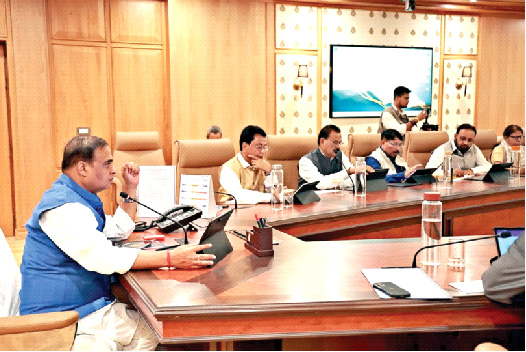In the picturesque landscapes of Assam, a persistent issue has cast its shadow — the contentious matter of religious conversions. Over the years, the focus has shifted towards the tribal communities and tea plantation workers, who have become primary targets for Christian Missionaries employing unconventional tactics, notably, “Magical Healing.”
Agenda-Driven Healing Camps
This method involves Missionaries organising healing camps in remote areas, often far removed from the reach of adequate healthcare facilities. The promise of miraculous cures for various ailments becomes a powerful lure for the impoverished villagers. Thare Bey, a tribal resident from the West Karbi Anglong hill district, sheds light on the situation, stating, “Missionaries conduct healing camps in our remote village, promising cures for critical diseases, deafness, dumbness and more, in exchange for conversion.”
The exploitation of vulnerable populations, especially in regions with poor healthcare infrastructure, has raised significant concerns. Reports have even exposed utilisation of funds from foreign countries, such as Germany, for conversion efforts during the challenging times of COVID-19 pandemic by churches based in Assam. As the issue gained prominence, the Assam Government stepped forward to address this intricate challenge.
Legislative Strike Against Missionaries
In a recent and crucial legislative move, the Assam Cabinet passed the Assam Healing (Prevention of Evil) Practices Bill 2024 on February 10. The Chief Minister, Himanta Biswa Sarma, emphasised the bill’s importance in curbing evangelism, particularly targeting tribal communities. He underscored the significance of preserving the religious status quo and expressed the Government’s commitment to eradicate coercive conversion practices.
Shedding light on the bill, Chief Minister Sarma stated, “This is a very important bill to curb the conversion of tribal people in the state. We want to ban evangelism in Assam.” The proposed legislation seeks to provide relief to victims of Magical Healing by criminalising anyone, irrespective of their religion, found guilty of practising Magical Healing in the name of treatment. The bill specifically targets healing in the name of treatment of congenital diseases, including deafness, dumbness, blindness, physical deformities and autism.
Once enacted, the Assam Healing (Prevention of Evil) Practices Bill 2024 is poised to become a pivotal tool in the State’s efforts to protect vulnerable populations from coercive conversions under the guise of Magical Healing.
This legislative initiative is not merely a reaction but a pro-active step by the Assam Government to safeguard the cultural and religious fabric of the State. As concerns over conversions heightened, it became imperative to address the root causes and put in place measures that would not only curb the practice but also provide justice to those who fell victim to deceptive promises.
Improving Healthcare Facilities
The comprehensive nature of the bill is reflected in its focus on tackling the multifaceted issue. Beyond the legal repercussions for those found guilty of engaging in Magical Healing practices, the legislation signals a broader commitment to enhancing healthcare infrastructure in remote areas. By addressing the root causes that make these communities susceptible to exploitation, the Government aims to create a more resilient social fabric.
The legislative journey of the Assam Healing (Prevention of Evil) Practices Bill 2024 is a testament to the democratic process at work. The bill, now set to be presented in the Assembly, marks a significant milestone in the State’s commitment to protect its diverse communities from the undue influence of coercive conversion practices.
The proposed legislation is not without its critics, with some expressing concerns about potential impacts on religious freedom. However, Chief Minister Sarma remains steadfast in his stance, emphasising the paramount importance of maintaining religious harmony while safeguarding vulnerable populations.
As Assam navigates this complex terrain, the world watches closely to see how the legislative intervention unfolds and whether it becomes a model for other regions grappling with similar challenges. The Assam Healing (Prevention of Evil) Practices Bill 2024 stands as a beacon of hope for those who have long sought protection from coercive conversion practices, offering the promise of a more inclusive and harmonious future for the diverse communities that call Assam home.
Trap Laid by Missionaries
In a recent incident in Tezpur city, Sonitpur district, Assam, two US citizens, John Matthew Bone and Michael James Flinchum, were detained for engaging in preaching activities on tourist visas. The duo entered India with e-passports, but their involvement in religious functions led to their arrest on February 3.
Acting on a tip-off, Sonitpur police apprehended Bone and Flinchum at Baptist Christian Hospital in Tezpur. A case (GDE 03/24) was registered at Kacharigaon Police Station, accusing them of flouting visa rules by participating in religious events and delivering speeches organised by church associations.
The detained US citizens were fined US$500 and Rs 41,486 in Indian currency before being released on certain conditions. Authorities informed the Ministry of External Affairs (MEA) about the incident, issuing warnings to both individuals regarding their involvement in religious functions.
This incident echoes a previous case on October 29, 2022 when seven German Missionaries were arrested in Kaziranga for violating visa norms. Similarly, three Swedish preachers faced deportation from Dibrugarh on October 26 for violating visa regulations and engaging in preaching activities.
Targeting Tribals
The German Missionaries attended religious meetings in Tinsukia, Golaghat, and Karbi Anglong districts, intending to extend their activities to Tezpur. However, as they were on tourist visas, participating in such religious activities was legally prohibited. Despite this, the detained Germans attended a function organised by a church association, leading to their arrest.
These cases shed light on a broader issue, as Missionaries often enter Assam on tourist visas and later engage in preaching activities in tea gardens and tribal areas. Many incidents go unreported due to organisers maintaining secrecy, but authorities occasionally take action.
Hindu organisations have revealed concerns about Christian Missionaries targeting tribal and tea garden areas for conversions, a trend that reportedly surged during the COVID-19 period and continues to raise questions about the visa compliance of such activities.




















Comments